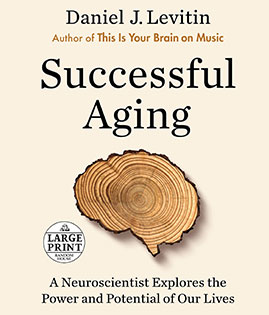Successful Aging: Health Span Is What Matters


 Neuroscientist and author Daniel J. Levitin emphasizes “that it is the interactions of genes, culture, and opportunity that are the biggest determinants of the trajectory our lives take; how our brains will change; and whether or not we’ll be healthy, engaged, and happy throughout the lifespan.”
Neuroscientist and author Daniel J. Levitin emphasizes “that it is the interactions of genes, culture, and opportunity that are the biggest determinants of the trajectory our lives take; how our brains will change; and whether or not we’ll be healthy, engaged, and happy throughout the lifespan.”
Recent studies show that our decision-making skills improve as we age and that our happiness levels peak at age eighty-two. In the ground-breaking book, Successful Aging: A Neuroscientist Explores the Power and Potential of Our Lives, Levitin turns his keen insights to what happens in our brains as we age.
He looks at the science behind what we all can learn from those who age joyously, as well as how to adapt our culture to take full advantage of older people’s wisdom and experience. Throughout his exploration of what aging really means, using research from developmental neuroscience and the psychology of individual differences, Levitin reveals resilience strategies and practical, cognitive enhancing tricks everyone should do as they age.
He adds that since our years are divided into what he calls “health span” and “disease span,” we should aim to prolong the former. As background, he devotes more than half the text to a fine overview of brain function, human physiology, and psychology that supports his point. Good genes are necessary but not sufficient; upbringing and environment play an essential role, and both work best if one takes advantage of opportunities.
 Some of his breathless prescriptions are old favorites—happy people live longer; eat mostly plants; have lots of friends; don’t retire—but he relies heavily on legitimate science, so readers will encounter life-extenders supported by studies (although not in humans) such as:
Some of his breathless prescriptions are old favorites—happy people live longer; eat mostly plants; have lots of friends; don’t retire—but he relies heavily on legitimate science, so readers will encounter life-extenders supported by studies (although not in humans) such as:
- Calorie restriction
- Metformin (helps control blood sugar)
- Rapamycin (drug issued to prevent age-related disease)
- As well as antioxidants and fish oil
Other powerful insights the book has to offer include:
- Debunking the myth that memory always declines with age
- Confirming that “health span”–not “life span”–is what matters
- Proving that sixty-plus years is a unique and newly recognized developmental stage
- ·Recommending that people look forward to joy, as reminiscing doesn’t promote health
Successful Aging inspires a powerful new approach to how readers think about our final decades, and it will revolutionize the way we plan for old age as individuals, family members, and citizens within a society where the average life expectancy continues to rise.